- Home
- Stephanie Laurens
Where the Heart Leads Page 4
Where the Heart Leads Read online
Page 4
“This bloke—what did he look like?”
Trug looked up at Barnaby’s blond curls. “Taller’n me, but not as tall as you. Nor as broad of shoulder. Bit heavier round the middle. Stocky like.”
“Did you notice his hands, by any chance?”
Trug looked surprised, then his expression turned thoughtful. “Didn’t look to be a bruiser, now I think on it. And not a navvy or anything like—his hands weren’t callused. Shopworker or…well, like he said. Worked for the authorities.”
Barnaby nodded. “Clothing?”
“Heavy coat—nothing special. Cloth cap, the usual. Work boots like we all wear round here.”
Barnaby didn’t follow Trug’s gaze as it lowered to his polished Hessians. “What about his speech—his accent?”
Looking up again, Trug blinked. “Accent? Well…” Trug blinked again, then looked at Penelope. “Stap me, but I hadn’t thought of that. He came from round here. East End. No question.”
Penelope looked at Barnaby.
He met her gaze, then turned to Trug. “Is your son in?”
“Aye.” Trug lumbered around to head inside. “He’s back here—I’ll fetch him.”
The son verified all his father had said. When asked for a guess as to the man’s age, he pursed his lips, then opined, “Not old. Maybe about me own age—twenty-seven that’d be.”
He grinned at Penelope. From the corner of his eye, Barnaby saw her eyes narrow, her dark gaze turn flinty.
“Thank you.” He nodded to both Trugs and stepped back.
“Aye, well.” Trug senior settled back behind his bench. “I know Monger wanted young Dick to go with the lady, so don’t seem right this other bloke should steal him. Who knows what he’s got in mind for him—he’ll be forcing the poor little beggar up a chimney, like as not.”
Penelope paled, but her expression only grew more determined. She, too, nodded to the Trugs. “Thank you for your help.”
Turning, she joined Barnaby. She waved at the tiny house on the other side of Dick’s father’s abode. “We should talk to Mrs. Waters. Dick spent the night with her, so she saw and spoke to the man, too.”
Summoned by a bell hanging beside her door, Mrs. Waters emerged from the depths of her cramped home. A large, motherly woman with a florid complexion and limp gray hair, she confirmed the Trugs’ description. “Aye, twenty-five years old, I’d say, and he was from round here somewheres, but not close. I know most on the nearby streets, and he’s not a local, so to say, but yes, he’d be an East Ender born and bred, the way he spoke.”
“So he was too young to be a bailiff or anything like that.” Penelope glanced at Barnaby.
Mrs. Waters snorted. “Not him—he wasn’t a leader of anything, nor in charge of anything, I’ll take my oath.”
Barnaby was struck by her certainty. “Why do you say that?”
Mrs. Waters’s brow furrowed in thought, then she said, “Because he wasn’t even in charge of what he was doing. He was careful spoken. Really careful—like someone had taught him what to say, and how to say it.”
“So you think he’d been sent here to do a job—he was an errand boy, as it were.”
“That’s it.” Mrs. Waters nodded. “Someone had sent him to fetch Dick, and that’s what he did.” Her face clouded; she looked up at Barnaby. “You find that beggar and get Dick back. A good boy he was, never any trouble, no malice in him at all. He don’t deserve whatever those bastards”—she glanced at Penelope—“begging your pardon, miss, are planning for him.”
Barnaby inclined his head. “I’ll do my best. Thank you for your help.” He held out his hand to Penelope. “Miss Ashford?”
She didn’t take his hand, but after thanking Mrs. Waters, she walked by his side back to the hackney. She had to take his hand to climb into the carriage. After instructing the driver to return to the Foundling House, Barnaby joined her and shut the door.
Slumping on the seat, he ran through what they’d learned, trying to see what it suggested.
She broke into his thoughts. “So it’s possible Dick is not all that far away.” Eyes narrowed, she stared apparently unseeing across the carriage. “Does that suggest anything—any specific activity?”
He considered her, then said, “The East End is a large and densely populated area.” Moreover, one teeming with vice.
She grimaced, then refocused on him. “So—what next?”
“I think…if you’re agreeable, I’d like to lay what we know before a friend—Inspector Basil Stokes of Scotland Yard.”
Her brows rose. “The police?” After a moment of returning his regard, she said, “To be perfectly honest I can’t imagine Peel’s Police Force evincing much interest in missing pauper boys.”
His smile was as cynical as her tone. “In the normal way of things, you would unfortunately be correct. However, Stokes and I go back a long way. And at this stage all I’ll do is alert him to the situation and ask for his opinion.” He paused, then went on, “Once he’s heard what we know…”
If Stokes, like Barnaby, felt his instincts pricking…
But he didn’t need to share such thoughts with Penelope Ashford.
He shrugged. “We’ll see.”
He returned Penelope to the Foundling House, then took the hackney on to Scotland Yard. Entering the bland and unremarkable building that now housed the Metropolitan Police Force, he made his way to Stokes’s office unchallenged; most in the building knew him by sight, and by reputation.
Stokes’s office was on the first floor. When Barnaby reached it, the door stood open. He paused just outside, looking in, a slow grin lifting his lips at the sight of his friend, coat off, sleeves rolled up, laboriously writing reports.
If there was one thing Stokes did not appreciate about his increasing success and status, it was the inevitable report writing.
Sensing a presence, Stokes glanced up, saw him, and smiled. Delightedly. He laid down his pen, pushed aside the stack of papers, and sat back. “Well, well—what brings you here?”
Anticipation rang in his tone.
With a laugh, Barnaby walked into the office—not tiny, thankfully, but of a size just large enough to accommodate four people at a pinch. Set before the window, the desk with its chair faced the door. A cupboard stood against one wall, packed with files. Stokes’s greatcoat hung from the coat hook on the wall. Slipping the buttons of his own elegant overcoat free, Barnaby let it fall open as he sank into one of the two chairs before the desk.
He met Stokes’s slate-gray eyes. Of similar height and build to Barnaby, dark-haired, with rather saturnine features, Stokes was peculiarly classless. His father had been a merchant, not a gentleman, but courtesy of his maternal grandfather, Stokes had been well educated. Because of that, Stokes had a better grasp of the ways of the ton, and therefore a better chance of dealing with the denizens of that elite world, than any other inspector presently on Peel’s force.
In Barnaby’s opinion, the force was lucky to have Stokes. Aside from all else, he was intelligent and used his brain. Which in part was why they’d become close friends.
Which in turn was why Stokes was eyeing him with such undisguised eagerness; he hoped Barnaby was about to save him from his reports.
Barnaby grinned. “I have a case that, while not in our usual way of things, might just pique your interest.”
“At present that wouldn’t be hard.” Stokes’s voice was deep, rather gravelly, a contrast to Barnaby’s well-modulated tones. “All our villains have gone on holiday early this year, or else they’ve retired to the country because we’ve made it too warm for them here. Either way, I’m all ears.”
“In that case…I’ve been asked by the administrator of the Foundling House in Bloomsbury to look into the disappearance of four boys.”
Succinctly, Barnaby outlined all he’d learned from Penelope, from his observations at the house, and during their trip to Clerkenwell. As he did, a gravity he hadn’t allowed Penelope to see infused his voice and his expres
sion.
By the time he concluded with, “The most pertinent fact is that it was the same man who whisked each of the four boys away,” he looked and felt distinctly grim.
Stokes’s face had hardened. His eyes had narrowed, darkening. “You want my opinion?” Barnaby nodded. “I don’t like the sound of it any more than you do.”
Sitting back in his chair, Stokes tapped one spatulate fingertip on his desk. “Let’s consider—what use could someone make of four—at least four—seven-to ten-year-old boys, all from the East End?” Without pause, Stokes answered the question. “Brothels. Cabin boys. Chimney sweeps. Burglars’ boys. Just to cite the more obvious.”
Barnaby grimaced; folding his hands over his waistcoat, he looked up at the ceiling. “I’m not so sure of the brothels, thank heaven. Surely they wouldn’t restrict themselves to the East End for such prey.”
“We don’t know how widespread this is. We might have heard about the East End cases simply because it’s the administrator at the Foundling House who called you in—and they deal mostly with the East End.”
“True.” Lowering his gaze, Barnaby fixed it on Stokes. “So what do you think?”
Stokes’s gaze grew distant. Barnaby let the silence stretch, having a fairly good idea of the issues with which Stokes was wrestling.
Eventually, a slow, predatory smile curved Stokes’s thin lips. He refocused on Barnaby. “As you know, normally we’d have no chance of getting permission to put any real effort into this—into finding four pauper boys. However, those possible uses we mentioned—none of them are good. All are, in themselves, crimes worthy of attention. It occurs to me, what with the way your recent success in dealing with tonnish villains has played out politically, and given the governors are so constantly exhorting us to be seen to be evenhanded in our efforts, that perhaps I might present this case as an opportunity to demonstrate that the force is not solely interested in crimes affecting the nobs, but equally prepared to act to protect innocents from the lower walks of life.”
“You might point out that at present, crime among the nobs is at a seasonal low.” Tilting his head, Barnaby met Stokes’s gaze. “So, do you think you can get permission to work on this?”
A moment passed, then Stokes’s lips firmed. “I believe I can make this play into their prejudices. And their politics.”
“Anything I can do to help?”
“You might drop a line to your father, just to shore up support in case of need, but other than that…I believe I’ll manage.”
“Good.” Barnaby sat up. “Does that mean you, specifically, will be joining in?”
Stokes looked at the stack of papers by his elbow. “Oh, yes. I’m definitely dealing myself into this game.”
Grinning, Barnaby rose.
Stokes looked up. “I should be able to catch the commissioner later today. I’ll send word as soon as I get clearance.” Rising, Stokes offered his hand.
Barnaby clasped it, then released it and saluted. “I’ll leave you to your persuasions.”
He headed for the door.
“One thing.”
Stokes’s voice halted Barnaby in the doorway; he looked back.
Stokes was already clearing away his papers. “You might like to ask the Foundling House’s administrator if there was anything those boys had in common. Any common feature—were they all small, all tall, all large, all thin. From good homes or the dregs. That might give us some clue as to what whoever has snatched them wants them for.”
“Good idea. I’ll ask.” With another salute, Barnaby left.
He’d said he’d ask, but he didn’t need to ask that day.
He didn’t need to seek out Penelope Ashford that very afternoon to pick her brains. She’d mentioned she was usually only at the Foundling House in the mornings. Even if he found her, wherever she might be, she wouldn’t have her files to consult.
Of course, all he’d learned of her suggested that she would be able to answer Stokes’s question without the need for any files.
Barnaby halted on the steps of Stokes’s building. Hands sunk in the pockets of his greatcoat, now done up against the chilly breeze, he contemplated the buildings across the street while debating pursuing Penelope Ashford, albeit in search of answers.
Being the sort of woman she was, if he hunted her up, she would assume he’d done so to question her.
Reassured, he smiled, strode down the steps, and set out for Mount Street.
By dint of asking a streetsweeper, he located Calverton House, and plied the knocker. A moment passed, then the door opened and an imposing butler met his gaze, brows rising in magisterial inquiry.
Barnaby smiled with easy charm. “Is Miss Ashford in?”
“I regret Miss Ashford is presently from home, sir. May I tell her who called?”
Smile evaporating, he looked down, wondering if he should leave any message. Predicting how Penelope might react—
“Mr. Adair, is it not?”
He looked up at the butler, whose expression remained entirely uninformative. “Yes.”
“Miss Ashford left word that should you call, sir, I was to inform you she’d had to accompany Lady Calverton on her afternoon rounds, as part of which she anticipated being in the park at the customary hour.”
Barnaby hid a grimace. The park. At the fashionable hour. A combination of place and time he habitually avoided. “Thank you.” He turned and went down the front steps. On the pavement he hesitated, then turned west.
And walked toward Hyde Park.
It was November. The skies were overcast, the breeze chill. Most of the glittering horde that populated the ton’s ballrooms had already decamped for the country. Only those associated with the corridors of power remained, as Parliament had not yet risen. It soon would, and then London would be all but devoid of tonnish society. Even now, the rows of carriages to be found lining the Avenue should have thinned significantly.
There wouldn’t be that many dowagers and matrons, let alone sweet young things, to see and wonder why he was intent on speaking with Penelope Ashford.
Crossing Park Lane, he strode through the gates and on, cutting across the lawns to where the carriages of the ladies of the haut ton always gathered.
His estimation of the park’s inhabitants proved both right and wrong. The gossipy matrons and giggling girls were thankfully absent, but the gimlet-eyed dowagers and the sharp-eyed political hostesses were very much in evidence. And courtesy of his father’s prominence and his mother’s connections, he was instantly identifiable—and of interest—to all of those.
The Calverton carriage was drawn up on the verge in the center of the line of carriages, ensuring he passed under the eyes of at least half the assembled ladies as he skirted the fringes of those passing back and forth. Lady Calverton was engaged in earnest conversation with two contemporaries; beside her, Penelope looked distinctly bored.
Lady Calverton saw him first. She smiled as he approached the carriage. Penelope glanced his way, then straightened, her characteristic animation infusing her features, making them glow.
“Mr. Adair.” Lady Calverton held out her hand, recalling him.
He took her gloved fingers and bowed over them. “Lady Calverton.”
Behind their gold-rimmed spectacles, Penelope’s eyes gleamed. He met them, and politely inclined his head. “Miss Ashford.”
She smiled easily; social assurance was something neither she nor Portia lacked. Turning to her mother, she said, “Mr. Adair is assisting me with inquiries into the backgrounds of certain of our charges.” She looked at Barnaby. “I daresay you have more questions, sir.”
“Indeed.” He, too, could play the social game. He glanced at the lawns nearby. “I wonder, Miss Ashford, if perhaps we might stroll while we talk?”
She smiled approvingly. “An excellent idea.” To her mother she said, “I doubt we’ll be long.”
Swinging open the carriage door, he offered her his hand. She grasped it and climbed down. Releasing him
, she shook out her skirts, then seemed mildly surprised when he offered his arm.
She took it, hesitantly laying her hand on his sleeve; to him her touch seemed almost wary.
Interesting. He doubted there was much in the ton, or out of it, that could make her…cautious. Yet he sensed it was that—and perhaps a need to seize control—that had her saying as they moved away from the carriage and the other strollers nearby, “I take it you spoke with your friend, Inspector Stokes. Have you learned anything?”
“Other than that Stokes is inclined to amuse himself by investigating these disappearances?”
The look she turned on him was gratifyingly wide-eyed. “You persuaded him to take up the case?”
Temptation bloomed, but chances were that she would meet Stokes at some point. “Not so much persuaded as assisted him to find reasons he should. Personally he was quite willing, but the force has its priorities. In this instance, Stokes felt he could make a case for action that would appeal to the commissioner.” He met her eyes. “He hasn’t yet received permission to put this case on his list, but he seemed confident of gaining approval.”
Penelope nodded and looked ahead. Police support was far more than she’d expected. Consulting Barnaby Adair had clearly been the right thing to do—even if her witless senses hadn’t yet learned how to be calm when near him. “You called Stokes a friend. Have you known him long?”
“Several years.”
“How did you meet?” She looked up. “Well—an earl’s son and a policeman. There had to be some event that brought him into your orbit. Or was it through your own investigating?”
He hesitated, as if remembering. “A bit of both,” he eventually conceded. “I was present at the scene of a crime—a series of thefts at a country house party—and he was sent to investigate. I was a close friend of the gentleman most wished to blame. Both Stokes and I were, in different ways, a little out of our depth. But we found we dealt well together, and our combined knowledge—mine of the ton, Stokes’s of the ways of criminals—proved successful in addressing the crime.”

 Lady Osbaldestone’s Plum Puddings: Lady Osbaldestone’s Christmas Chronicles Volume 3
Lady Osbaldestone’s Plum Puddings: Lady Osbaldestone’s Christmas Chronicles Volume 3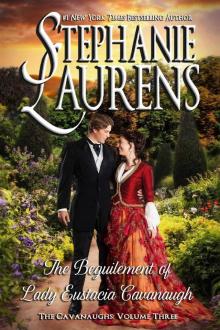 The Beguilement of Lady Eustacia Cavanagh: The Cavanaughs Volume 3
The Beguilement of Lady Eustacia Cavanagh: The Cavanaughs Volume 3 Loving Rose: The Redemption of Malcolm Sinclair (Casebook of Barnaby Adair)
Loving Rose: The Redemption of Malcolm Sinclair (Casebook of Barnaby Adair) By Winter's Light
By Winter's Light Devil's Bride
Devil's Bride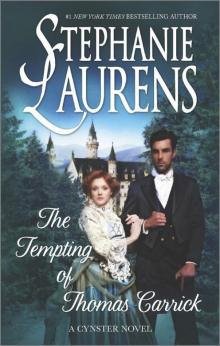 The Tempting of Thomas Carrick
The Tempting of Thomas Carrick![Cynster [22.00] A Match for Marcus Cynster Read online](http://i1.bookreadfree.com/i/03/16/cynster_[22_00]_a_match_for_marcus_cynster_preview.jpg) Cynster [22.00] A Match for Marcus Cynster
Cynster [22.00] A Match for Marcus Cynster All About Love c-6
All About Love c-6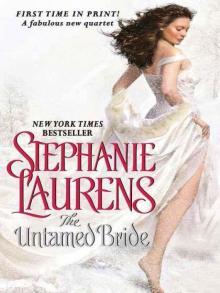 Cobra 01 The Untamed Bride
Cobra 01 The Untamed Bride A Lady of Expectations and Other Stories
A Lady of Expectations and Other Stories By Winter's Light_A Cynster Novel
By Winter's Light_A Cynster Novel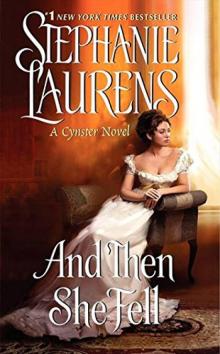 And Then She Fell
And Then She Fell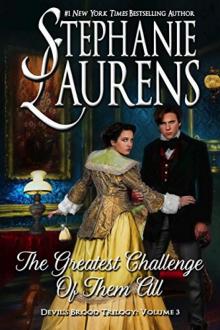 The Greatest Challenge of Them All
The Greatest Challenge of Them All The Edge of Desire
The Edge of Desire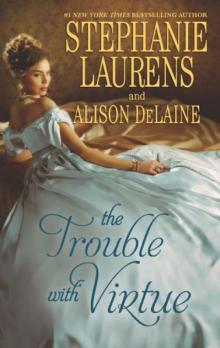 The Trouble With Virtue: A Comfortable WifeA Lady by Day
The Trouble With Virtue: A Comfortable WifeA Lady by Day Fair Juno
Fair Juno THE LEGEND OF NIMWAY HALL: 1750 - JACQUELINE
THE LEGEND OF NIMWAY HALL: 1750 - JACQUELINE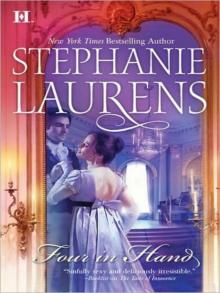 Four In Hand
Four In Hand The Reckless Bride
The Reckless Bride Stephanie Laurens Rogues' Reform Bundle
Stephanie Laurens Rogues' Reform Bundle The Untamed Bride Plus Black Cobra 02-03 and Special Excerpt
The Untamed Bride Plus Black Cobra 02-03 and Special Excerpt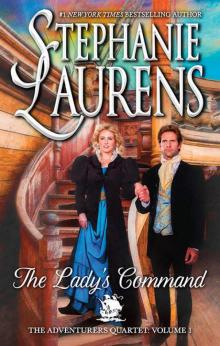 The Lady's Command (Adventurers Quartet #1)
The Lady's Command (Adventurers Quartet #1) The Seduction of Sebastian Trantor
The Seduction of Sebastian Trantor The Daredevil Snared (The Adventurers Quartet Book 3)
The Daredevil Snared (The Adventurers Quartet Book 3)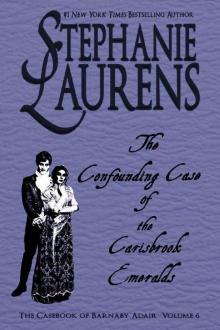 The Confounding Case Of The Carisbrook Emeralds (The Casebook of Barnaby Adair 6)
The Confounding Case Of The Carisbrook Emeralds (The Casebook of Barnaby Adair 6) Lord of the Privateers (The Adventurers Quartet)
Lord of the Privateers (The Adventurers Quartet)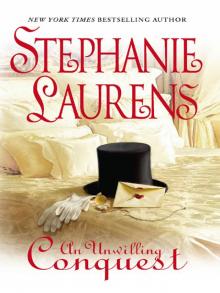 An Unwilling Conquest
An Unwilling Conquest Brazen Bride
Brazen Bride On a Wild Night
On a Wild Night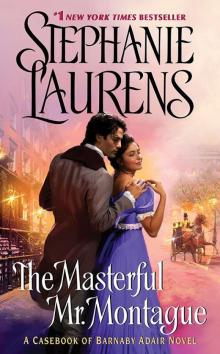 The Masterful Mr. Montague: A Casebook of Barnaby Adair Novel
The Masterful Mr. Montague: A Casebook of Barnaby Adair Novel Lord of the Privateers
Lord of the Privateers Royal Bridesmaids
Royal Bridesmaids Beyond Seduction
Beyond Seduction It Happened One Night
It Happened One Night The Ideal Bride
The Ideal Bride The Promise in a Kiss
The Promise in a Kiss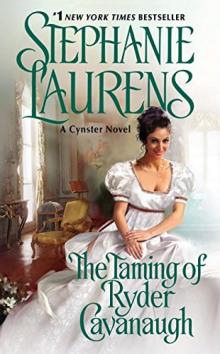 The Taming of Ryder Cavanaugh
The Taming of Ryder Cavanaugh The Ideal Bride c-12
The Ideal Bride c-12 All About Love
All About Love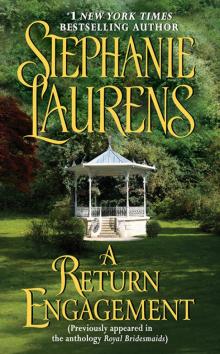 A Return Engagement
A Return Engagement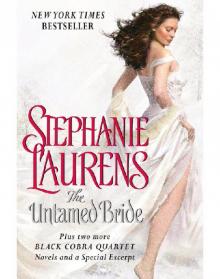 The Untamed Bride Plus Two Full Novels and Bonus Material
The Untamed Bride Plus Two Full Novels and Bonus Material Viscount Breckenridge to the Rescue
Viscount Breckenridge to the Rescue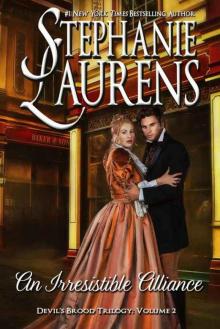 An Irresistible Alliance (Cynsters Next Generation Novels Book 5)
An Irresistible Alliance (Cynsters Next Generation Novels Book 5) The Daredevil Snared
The Daredevil Snared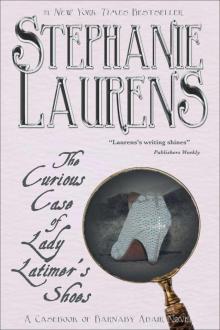 The Curious Case of Lady Latimer's Shoes: A Casebook of Barnaby Adair Novel
The Curious Case of Lady Latimer's Shoes: A Casebook of Barnaby Adair Novel A Lady of Expectations and Other Stories: A Lady of ExpectationsThe Secrets of a CourtesanHow to Woo a Spinster
A Lady of Expectations and Other Stories: A Lady of ExpectationsThe Secrets of a CourtesanHow to Woo a Spinster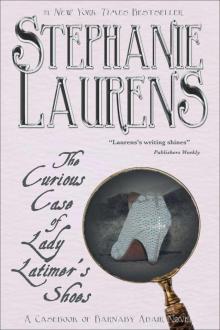 The Curious Case of Lady Latimer's Shoes: A Casebook of Barnaby Adair Novel (The Casebook of Barnaby Adair)
The Curious Case of Lady Latimer's Shoes: A Casebook of Barnaby Adair Novel (The Casebook of Barnaby Adair)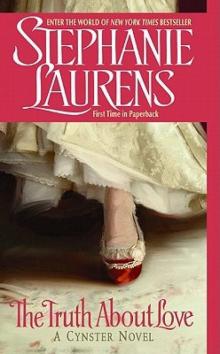 The Truth About Love
The Truth About Love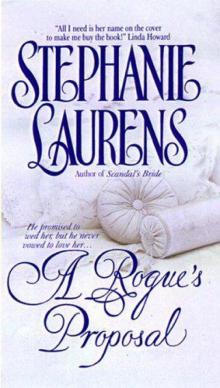 A Rogue's Proposal
A Rogue's Proposal The Elusive Bride
The Elusive Bride The Perfect Lover
The Perfect Lover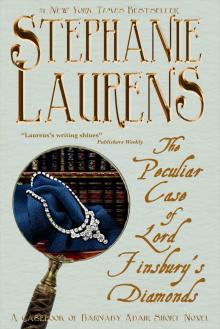 The Peculiar Case of Lord Finsbury's Diamonds: A Casebook of Barnaby Adair Short Novel
The Peculiar Case of Lord Finsbury's Diamonds: A Casebook of Barnaby Adair Short Novel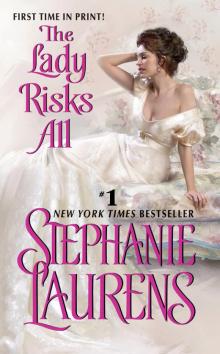 The Lady Risks All
The Lady Risks All The Murder at Mandeville Hall: The Casebook of Barnaby Adair: Volume 7
The Murder at Mandeville Hall: The Casebook of Barnaby Adair: Volume 7 All About Passion
All About Passion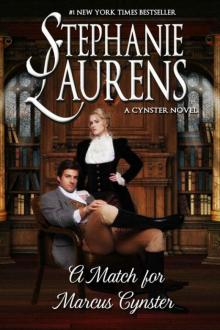 A Match for Marcus Cynster
A Match for Marcus Cynster By Winter's Light: A Cynster Novel (Cynster Special Book 2)
By Winter's Light: A Cynster Novel (Cynster Special Book 2)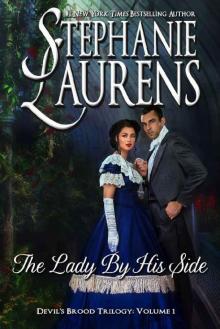 The Lady By His Side
The Lady By His Side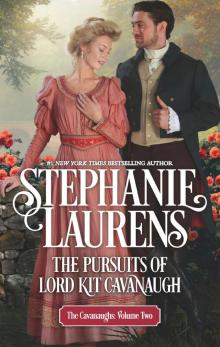 The Pursuits of Lord Kit Cavanaugh
The Pursuits of Lord Kit Cavanaugh Tangled Reins
Tangled Reins To Distraction
To Distraction A Rake's Vow
A Rake's Vow A Comfortable Wife
A Comfortable Wife A Lady of His Own bc-3
A Lady of His Own bc-3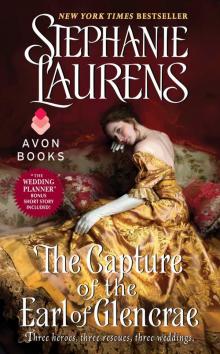 The Capture of the Earl of Glencrae
The Capture of the Earl of Glencrae Scandals Bride c-3
Scandals Bride c-3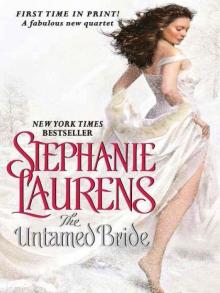 Untamed Bride
Untamed Bride The Brazen Bride
The Brazen Bride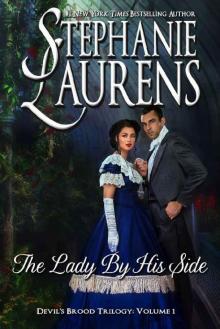 The Lady By His Side (Cynsters Next Generation Novels Book 4)
The Lady By His Side (Cynsters Next Generation Novels Book 4)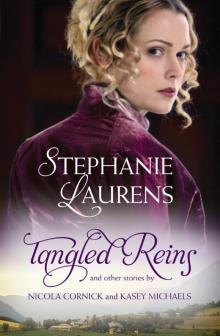 Tangled Reins and Other Stories
Tangled Reins and Other Stories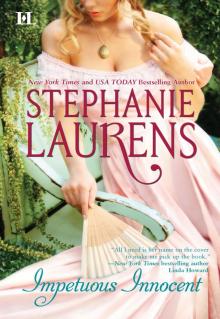 Impetuous Innocent
Impetuous Innocent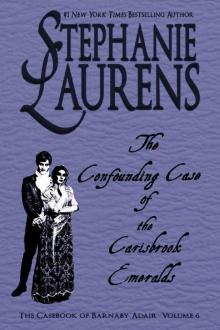 The Confounding Case Of The Carisbrook Emeralds
The Confounding Case Of The Carisbrook Emeralds Stephanie Laurens - B 6 Beyond Seduction
Stephanie Laurens - B 6 Beyond Seduction What Price Love?
What Price Love? A Fine Passion
A Fine Passion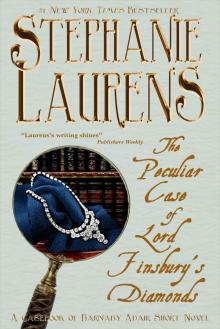 The Peculiar Case of Lord Finsbury's Diamonds: A Casebook of Barnaby Adair Short Novel (The Casebook of Barnaby Adair)
The Peculiar Case of Lord Finsbury's Diamonds: A Casebook of Barnaby Adair Short Novel (The Casebook of Barnaby Adair) Where the Heart Leads
Where the Heart Leads The Designs of Lord Randolph Cavanaugh
The Designs of Lord Randolph Cavanaugh A Secret Love c-5
A Secret Love c-5 On a Wicked Dawn c-10
On a Wicked Dawn c-10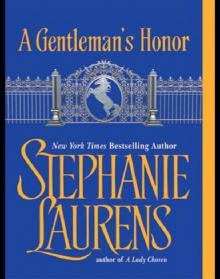 A Gentleman's Honor
A Gentleman's Honor THE LEGEND OF NIMWAY HALL_1750_JACQUELINE
THE LEGEND OF NIMWAY HALL_1750_JACQUELINE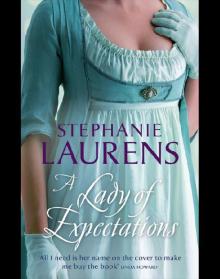 A Lady of Expectations
A Lady of Expectations Royal Weddings: An Original Anthology
Royal Weddings: An Original Anthology The Ideal Bride (Cynster Novels)
The Ideal Bride (Cynster Novels) Mastered by Love
Mastered by Love A Buccaneer at Heart
A Buccaneer at Heart Captain Jack’s Woman / A Gentleman's Honor
Captain Jack’s Woman / A Gentleman's Honor Devil's Bride with Bonus Material
Devil's Bride with Bonus Material A Lady of His Own
A Lady of His Own A Secret Love
A Secret Love Melting Ice
Melting Ice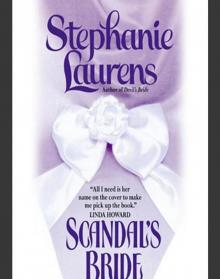 Scandal's Bride
Scandal's Bride Lady Osbaldestone’s Christmas Goose
Lady Osbaldestone’s Christmas Goose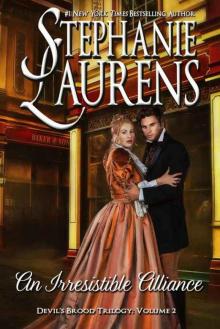 An Irresistible Alliance
An Irresistible Alliance It Happened One Season
It Happened One Season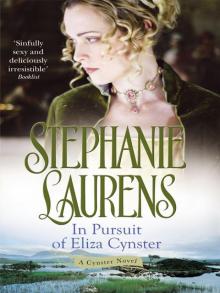 In Pursuit Of Eliza Cynster
In Pursuit Of Eliza Cynster Captain Jack's Woman
Captain Jack's Woman The promise in a kiss c-8
The promise in a kiss c-8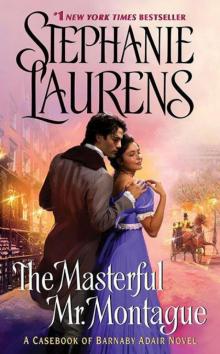 The Masterful Mr. Montague
The Masterful Mr. Montague The Lady Chosen
The Lady Chosen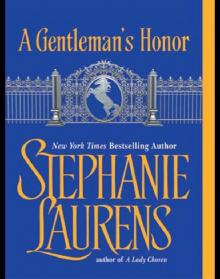 A Gentleman's Honor bc-2
A Gentleman's Honor bc-2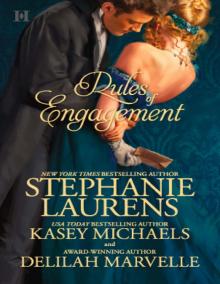 Rules of Engagement: The Reasons for MarriageThe Wedding PartyUnlaced (Lester Family)
Rules of Engagement: The Reasons for MarriageThe Wedding PartyUnlaced (Lester Family) Secrets of a Perfect Night
Secrets of a Perfect Night The Taste of Innocence
The Taste of Innocence On A Wicked Dawn
On A Wicked Dawn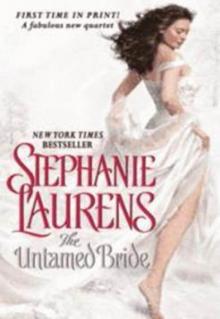 The Untamed Bride
The Untamed Bride A Rogues Proposal c-4
A Rogues Proposal c-4 Rakes Vow c-2
Rakes Vow c-2 Devils Bride c-1
Devils Bride c-1 Hero, Come Back
Hero, Come Back On a Wild Night c-8
On a Wild Night c-8 All About Passion c-7
All About Passion c-7